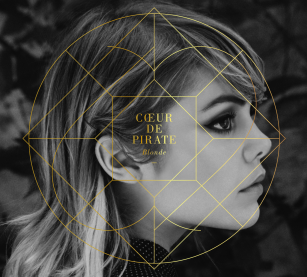By Leanna Pankratz (The Cascade) – Email
Print Edition: February 8, 2012
 It is admittedly rare that a foreign language album breaks its way into the English-speaking mainstream. However, this is exactly the feat accomplished by nineteen-year-old francophone chanteuse Beatrice Martin, who is more commonly recognized by her stage name, Coeur de Pirate. Martin released her sophomore album, Blonde, on November 7, 2011 – an album that reached number one on French-Canadian charts, and whose title is a wink-and-nudge to the underlying theme of its tracks (the word blonde is common slang for “girlfriend” in Quebec). Martin certainly makes no secret that her own experiences as a once-too-often jilted girlfriend are what drove her pen this album. “While the story is very personal, this album is not so much a breakup album as a relationship album,” she stated in an interview with Exclaim.ca. “It discusses every single phase of a relationship. For me, it was about a girl who loves a boy and everything that comes with it. And it’s kind of a tribute to the people I have loved. It wasn’t just one boy.”
It is admittedly rare that a foreign language album breaks its way into the English-speaking mainstream. However, this is exactly the feat accomplished by nineteen-year-old francophone chanteuse Beatrice Martin, who is more commonly recognized by her stage name, Coeur de Pirate. Martin released her sophomore album, Blonde, on November 7, 2011 – an album that reached number one on French-Canadian charts, and whose title is a wink-and-nudge to the underlying theme of its tracks (the word blonde is common slang for “girlfriend” in Quebec). Martin certainly makes no secret that her own experiences as a once-too-often jilted girlfriend are what drove her pen this album. “While the story is very personal, this album is not so much a breakup album as a relationship album,” she stated in an interview with Exclaim.ca. “It discusses every single phase of a relationship. For me, it was about a girl who loves a boy and everything that comes with it. And it’s kind of a tribute to the people I have loved. It wasn’t just one boy.”
However, Blonde’s lyrics of spurned romance are not crafted for cry-along sessions à la Adele, and that is the precise reason the album feels so uniquely fresh. Comparing it to her first self-titled, piano driven, and slightly generic first album, Coeur de Pirate’s latest discographic addition has taken her sound in a new direction that has granted her a certainly more definitive style – a welcome commodity in the often incomprehensible jumble that is the indie music scene.
In Blonde, Martin demonstrates an admirable talent for combining her poignant and sharp lyrics with a quirkily retro tone that pervades the album – an homage to the sprightly pop music in the swinging sixties. “I really wanted Blonde to sound classic,” Martin said in the same interview with Exclaim. “To me, the sixties are perfect – in change, in cinema, in culture. And I really like what they did in France as well when it comes to music, so I am very inspired by that musical and cultural era. One could sing about very intense subjects with very light and happy music. My lyrics aren’t happy, but the music is Riviera-chic – very danceable.” In the duration of Blonde, the doll-featured, bouffant-haired and tattooed Martin weaves melodies that are certainly reminiscent of a French New Wave soundtrack. Tracks such as “Danse et Danse” and “Golden Baby” betray an obvious and charmingly arranged homage to all things Bardot, Gall, and Gainsbourg – modernized by an occasional grungy guitar lick, and vocals that never lose their inherent edge.
Non-French-speaking listeners who may feel deterred by the suggestion of a Francophone album will be reassured at the accessibility of Coeur de Pirate. In each track is a remarkable attention to detail by the artist, along with a healthy dose of culture-defying emotional universality that transcends even an obvious language barrier. Martin’s songs are multi-layered and full-sounding, utilizing everything from piano, soft, cinematic strings, surf guitar and retro drum beats. From the smartly arranged “Adieu” to the catchy, almost early Beatles-esque “Pour un Infidele,” she relays tales of heartbreak, betrayal, and revenge with a grin, wink, and bite – never, however, losing the whimsically insouciant quality that makes Blonde so remarkably listen-able.

